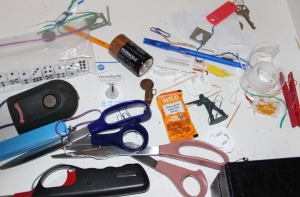Luckily for me, I’m both (or at least have been both in the recent past).
I was cleaning out our junk drawer the other day – because we’re getting ready to move, not because I was desperately looking for procrastination excuses – and near the end of my task I glanced down to find it just as it’s pictured here. It struck me as mildly poetic somehow, so I took a break and snapped a picture. Ordinary objects can be fertile ground for writing if you look with the right eye…
In our house, the junk drawer is the catch-all place, where for some reason we keep life’s everyday essentials (scissors and pens) buried alongside the crap we will never, ever use again under any circumstances (year-old soy sauce and manuals to phones I recycled years ago). It’s the one place in the house where hoarding is normal and accepted, even in the tidiest, most minimalist homes. And in my home, which is neither tidy nor minimalist, it’s a place where the crazy really shows. This picture is just the 10% that was left at the bottom.
The writer’s brain is a lot like a junk drawer. We stow things away — both purposefully and at whim — never really knowing if they will resurface, or if they do, if they’ll be useful. An idea that seems essential to our work one minute can become trite and irrelevant the next. Or we scribble something thoughtlessly, only to find it again months later with fresh eyes and find it’s exactly what we need at a crucial moment in a story. It’s a beautiful process of acquiring, storing, and finally (painfully) purging ideas until we have something inspiring or useful to share. It’s good to have a quantity of stuff to draw from, but only when we’re willing to take the time to filter through it will we have the opportunity to see things clearly.
So when was the last time you went through the clutter from your own junk drawer, literally or figuratively? What inspiration can you find at the bottom of your pile — or mine, for that matter? It could be an army guy next to a poignant Taco Bell sauce packet, a mystery key, or a bag of dice. Or maybe an idea that got shelved months ago because it wasn’t ready for the world. Inspiration for a brand new story, or simply texture for a work in progress. Either way, maybe it’s time to revisit something you’ve stashed away, so that you can either toss it aside forever or give it a new life in the light of day.
I’d love to read junk-drawer stories – please link in the comments if you write one!

